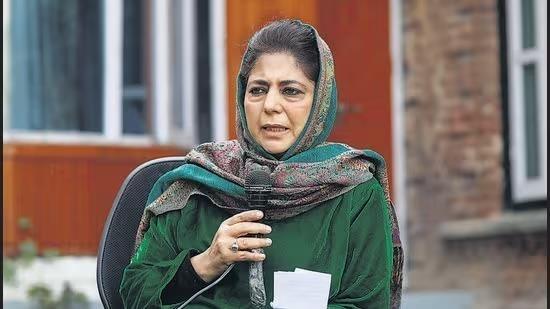
Title: Hope India-Pakistan ceasefire will be permanent: Mehbooba Mufti
In a recent development, the India-Pakistan ceasefire understanding has brought a sigh of relief to the people of Jammu and Kashmir. After the ceasefire was declared, PDP chief Mehbooba Mufti visited a hospital in Baramulla to meet those injured in Pakistani shelling. The visit was a symbolic gesture of solidarity with the victims and a call to action for the government to provide necessary assistance to those affected by the conflict.
During her visit, Mufti expressed hope that the ceasefire would become permanent, putting an end to the long-standing border tensions between India and Pakistan. She emphasized that the attacks have stopped, and it is essential to work towards a lasting solution. “The ceasefire was declared yesterday, and the attacks have stopped… Hopefully, it will become permanent,” she said.
The ceasefire agreement came into effect on February 25, after a series of intense clashes between Indian and Pakistani forces in the past few weeks. The agreement has been welcomed by both countries, and the people of Jammu and Kashmir are hoping for a sustained period of peace.
Mufti’s visit to the hospital was a heartwarming gesture, as she met with the families of those injured in the shelling. She listened to their stories, offered words of comfort, and assured them that the government was working towards providing necessary assistance. Her visit was a reminder that the people of Jammu and Kashmir are not just statistics or news headlines, but human beings who deserve empathy and support.
The conflict between India and Pakistan has been ongoing for decades, with each side accusing the other of ceasefire violations. The situation has become increasingly volatile in recent years, with both countries exchanging heavy fire along the Line of Control (LoC). The ceasefire understanding is a significant step forward, as it marks a departure from the usual pattern of violence and aggression.
However, the ceasefire is not without its challenges. There are still concerns about the sustainability of the agreement, and the risk of fresh clashes remains. The Indian government has been under pressure to take a tough stance on Pakistan, and the ceasefire understanding has been seen as a compromise. The Pakistani government, on the other hand, has been accused of not doing enough to prevent ceasefire violations.
Despite these challenges, the ceasefire understanding provides a glimmer of hope for a peaceful resolution. It is essential for both countries to work towards a lasting solution, rather than relying on temporary agreements that can be broken at any moment. The people of Jammu and Kashmir have suffered enough, and it is time for a more humane and sustainable approach to conflict resolution.
In her visit to the hospital, Mufti also urged the government to provide necessary assistance to those who lost their homes during the conflict. The conflict has resulted in widespread destruction, and many families have been left homeless. The government has a responsibility to provide relief and rehabilitation to those affected, and Mufti’s call for assistance is a reminder of the need for a more comprehensive approach to conflict resolution.
In conclusion, the India-Pakistan ceasefire understanding is a significant step forward, and Mehbooba Mufti’s visit to the hospital was a heartwarming gesture of solidarity with the victims. The ceasefire provides hope for a more peaceful future, and it is essential for both countries to work towards a lasting solution. The people of Jammu and Kashmir deserve a better life, free from the fear of violence and aggression. It is time for a more humane and sustainable approach to conflict resolution, and the ceasefire understanding is a step in the right direction.
News Source: https://x.com/PTI_News/status/1921481292060950629






